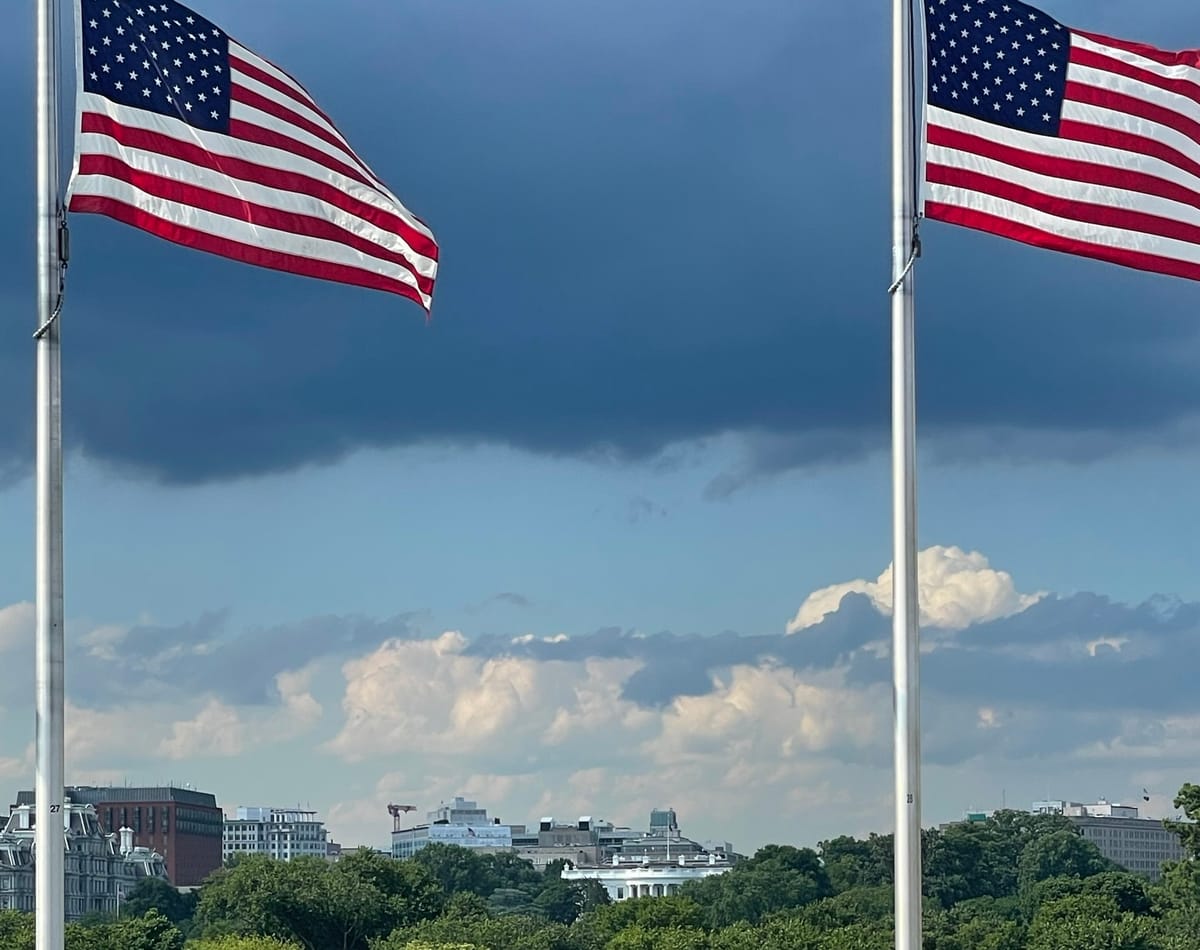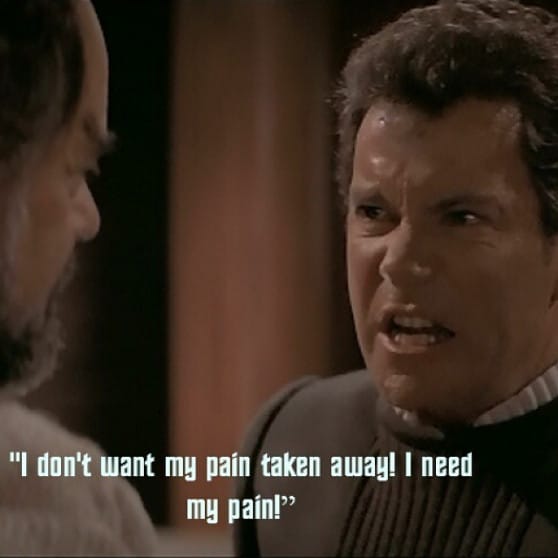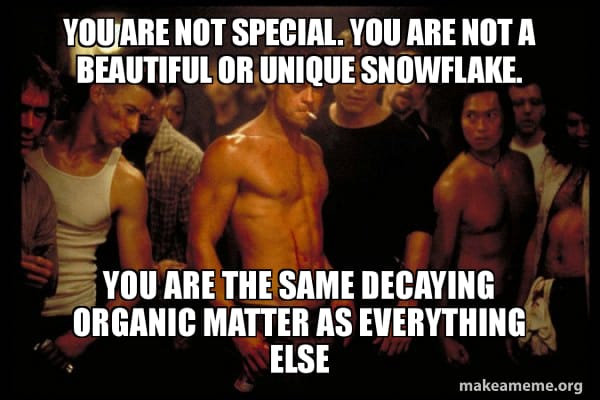The False Dichotomy of American Lore

I've had trouble knowing what to say here lately. In the past few months, I've focused on my novel in some ways to hide from the world going on outside. It's been a hard year for me personally and each new day brings another existential crisis. Maybe it's just that BlueSky has gained so much traction that I've resumed my morning ritual of doomscrolling before work. It's not healthy but like Captain Kirk "I need my pain"[1]

I've felt the need to speak about the election for several weeks, but I stopped short because I don't know how to write about it without sounding hopeless. It's hard to love America right now as much as I want to.
The killing of United Health's CEO this past week spurred me to get some thoughts out. I don't condone violence but the almost universal response of "Oh well, anyway" provides a modicum of hope that we can at least acknowledge a real problem instead of talking past each other.[2] As of the time of this writing, the perpetrator has not been captured. We're watching a folklore in progress which is funny because when I had the idea for this article months ago, folklore is what I wanted to talk about.
America is full of heroes. We're the "Land of the free, and the home of the brave" after all. We wax poetic about Jonny Appleseed, The Boston Tea Party, and Paul Revere. We build statues of great presidents[3] and extoll explorers like Lewis and Clark or Daniel Boone. We believe in the icons who faced horrible hardships and believe that we can be like them. "Give me liberty or give me death! "We have nothing to fear but fear itself!" or down here in Texas, "Remember the Alamo!". We all "have a dream", we all want to take "one small step."
America's shared experiences are what makes us American. As a nation of immigrants, we don't have a thousand years of kings and conquest. We are regular people who met the moment to do extraordinary things. We became the shining city on the hill, a nation backed by God, so exceptional that whatever we choose is right and pure.
We forget that it was luck. Not that our heroes weren't extraordinary people but that so many conditions were right for them to excel. America formed during a time of great discovery and exploration. Three hundred years of renaissance morphed into the Industrial Revolution creating wealth for regular people for the first time. The compass and other navigational aids allowed for sailing ships to cross vast oceans and Europeans took advantage of people through superior technology and unintentional germ warfare. With wealth and trade a middle class developed and revolutions sprang up as regular people threw off millennia of monarchies. With revolution came new ideas of government and capital and America became a blank slate for which people could experiment with those ideas without having to replace an entrenched system. We forget it could have happened anywhere, that there could be any number of Paul Reveres and Patrick Henrys among native Americans, Asians, or Africans that were all enslaved by European powers, doomed to slavery through the horrors of colonization.
Worst of all we forget our heroes' flaws. We forget that many of our founders owned slaves or became wealthy from their trade. Even when we acknowledge their shortcomings, we make excuses. "That's just how it was back then" or "He was nice to his slaves."[4] America and its heroes are good and right, backed by God, and any sins they commit are forgiven. The World Wars and the Cold War further cemented this dichotomy as every struggle became painted as good vs. evil.
This is particularly dangerous as our empire wanes.[5] Not because we've lost our military might or influence but because we've allowed oligarchs to control our media and buy our politicians. As things get worse for regular people they start lashing out. Our politicians invent monsters to direct our anger at– minorities, immigrants, and LGBTQ+ folks. Those deemed "other" are the people debasing our society and bringing our troubles. Not the landlords who raise our rents or the CEOs using algorithms to deny healthcare. Not the capitalists who raise prices on food but refuse to raise wages for their workers. Not the billionaires who dodge their taxes while buying up media sources and wage war with lawsuits to silence their critics. We stick our heads in the sand and vote for people who make us feel strong. We're exceptional and we've done nothing wrong.
None of this started in 2016 with Donald Trump or even in the 1994 midterms when the GOP swept their way into power for the first time in generations. Aside from two brief periods from 1900 through 1920 and again at the end of World War II until the mid-1960s, America has largely been run by people who pursue the interests of the very wealthy. Even during those periods we collectively forget that the benefits didn't extend to anyone beyond white men. Even now we watch the right run their elections on a platform of being superior to someone else. No matter how poor and destitute a white man is, he's better than liberal women, minorities, gays, and now trans people. I remember growing up in the 1980s, watching society warm up to the idea of racial equality only to watch the same people nod along when Donald Trump claimed that Vice President Harris "was for they/them, Donald Trump is for you". The most cynical and disgusting thing is that as Americans we are they, and we are them. The right-wing implores us to fight against ourselves to our detriment. Whether they demonize trans people or immigrants, they demonize us. As a society, we fall for it every time. I'm reminded of "The Who" singing Won't Get Fooled Again and here we are more than 50 years later, being fooled by the same false premise– that on an individual level, we're special and our specialness is under attack.

Our lore paints a rosy picture that our heroes overcome injustice and that injustice is forever banished. Martin Luther King's famous "I Have a Dream" speech is often quoted as an example of living in harmony with all races but rarely does anyone remember the prescription for achieving that dream. In 1967 Dr. King gave a speech "Beyond Vietnam" where he said:
I am convinced that if we are to get on the right side of the world revolution, we as a nation must undergo a radical revolution of values. We must rapidly begin—we must rapidly begin the shift from a thing-oriented society to a person-oriented society. When machines and computers, profit motives and property rights are considered more important than people, the giant triplets of racism, extreme materialism and militarism are incapable of being conquered.
Societies don't progress in a linear fashion. Sometimes they step backwards when tribalism and cynicism take hold. They fracture when we turn on each other to protect our scraps and the things we believe we built with our own hands, forgetting all the shoulders we had to stand on to accomplish our achievements. We complain that it isn't fair when we perceive someone else got something we thought we deserved.[6] Society won't progress until we can put aside our selfishness and do the work of heroes ourselves.
The first truth is there are no heroes. The names that history remembers are but the tip of the iceberg of those that affected change. The second truth is that the work is never done. George Washington, Thomas Jefferson, and Alexander Hamilton needed the will of a population and the sacrifice of soldiers to form a more perfect union. Two hundred and fifty years later we're still far from perfect. Lincoln and MLK needed a lot of blood and courage during their respective times, not to mention all the nameless people who kept up the fight for racial equality in the hundred years between them and in the fifty since. Teddy Roosevelt didn't enshrine worker rights by empowering unions, and today unions are weaker than ever, eroded by the false idea that we can bargain with powerful employers as individuals. Worker rights at the turn of the century took courage, protest, and sometimes blood. A chapter of history our current oligarchs would love for everyone to forget.
Sixteen hundred words in and it feels pretty hopeless. I tried hard to avoid it. Honestly, I won't tell people how to feel. We each have to take up the work to move the needle in the other direction. Mr. Rogers is often quoted saying "Look for the helpers" when we see scary things in the news. He said that for kids, on a kids' show. As adults, we must be the helpers. We must do the work to ensure society is better, not only for our own children if we choose to have them, but for everyone. None of us is free until we're all free.
What does that look like? It means taking care of ourselves. Resting, turning off, trying not to be outraged, and exhausted at every little thing. Things are bad, the new administration will be insane, but not one of us can fight against all of us. There are no heroes except the heroes of all of us as a collective. We're going to need to save our energy for the times when we need great courage. That courage is standing up for our neighbors, whether they're immigrants, trans, or something else that angry mobs have deemed unworthy. I hope that for most of us it's a kind word, a donation to someone's cause, or telling some prick to fuck off when they make a snide remark. I hope it doesn't come to us being arrested for shielding people from authorities but I don't know. I hope for the best and prepare for the worst.
On a grander scale, we need to get involved. We need to care about politics. More of us (and I'm preaching to myself) need to show up to school board and city council meetings. We need to make sure our food banks are stocked and our homeless people have shelter. We need to advocate in our communities for the most vulnerable. Almost half the country didn't vote in the last election. If you were one of those people you have to get off the sidelines. If you did vote, then we need your help to get more people off the fence and involved.
We need to start agreeing on the problems and pushing back against bullshit. One of the reasons I'm encouraged by the response to the United Healthcare shooting is people across the political spectrum started agreeing that American healthcare is broken. We may have different ideas on how to fix it (again, shooting CEOs probably won't help) but now we have somewhere to start figuring out how. As for pushing back against bullshit, I think the important thing to remember is not to engage in bad-faith arguments. If a faceless entity is going to destroy society, start asking how. We all wish for better media that tells the truth instead of what people want to hear but we can start telling the truth and refusing to debate over who has the right to exist.
Finally, we need to protest. When faced with cynicism and injustice we must be prepared to take to the streets and demand our voices be heard. Our government is going to continue to support things we hate, probably more so now than they have and we must hold them accountable.
One thing is for certain, America will change. I hope that the giant issues we face don't result in violence but I fear it's too late for that. Practice grace and forgiveness, hold people accountable[7], and, above all, never give up. Our heroes can be helpful and our lore can be a powerful rallying cry but we must reject the false dichotomy of good vs. evil. We must disavow the idea that our political side is inherently "good" or that our nation is inherently "good". We must listen to each other and embrace nuance. We must practice empathy, love mercy, and demand justice.
- From Star Trek V ... aka "The Search for God".
- If you're new here I do believe that one side brings up real problems while the other engages in hyperbole and fabrication to invent false issues.
- On stolen land!
- Slavery was bad. There was no good slavery no matter how well someone was treated.
- Make no mistake, we may not have an emperor but we have all the classic hallmarks of empire. We influence through economics and project power through a military that wields strength the likes of which would have seemed magic a mere hundred years ago.
- Seriously, most of the money spent on "entitlements" goes toward the bureaucracy of who qualifies for them. We'd save money with things like universal care and universal income.
- Forgiveness does not mean absolving someone of accountability. I should write a whole post on that.